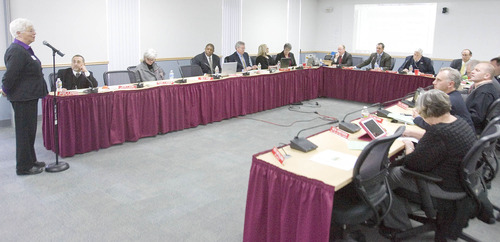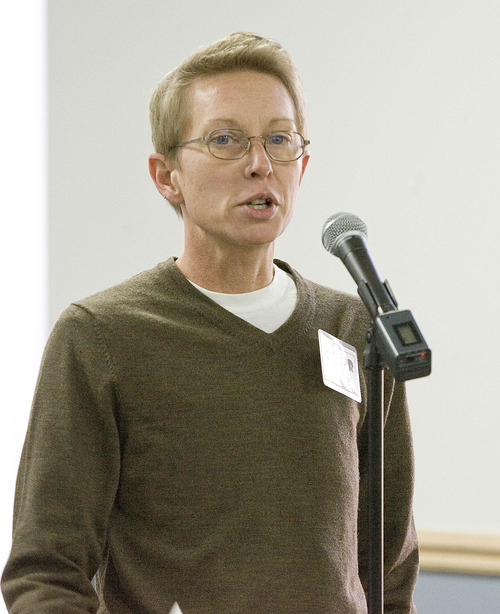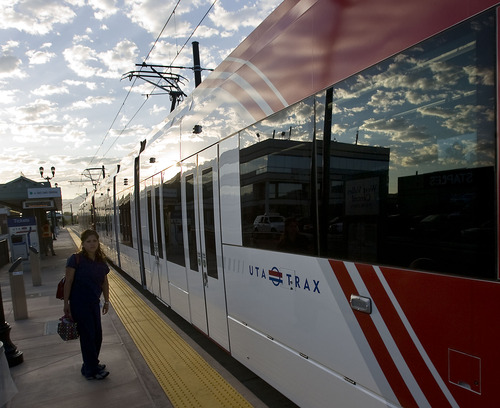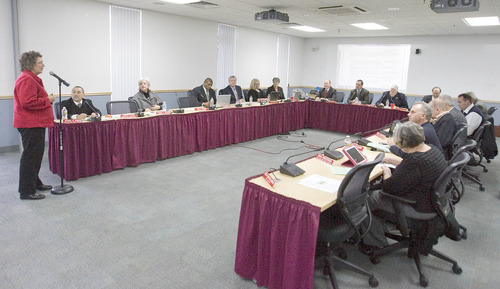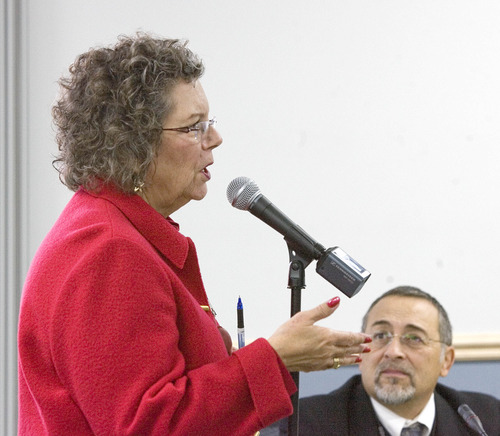This is an archived article that was published on sltrib.com in 2012, and information in the article may be outdated. It is provided only for personal research purposes and may not be reprinted.
Just after 10 anti-poverty and environmental groups asked the Utah Transit Authority board Wednesday to work toward lower fares to increase ridership, cut pollution and assist the poor, the board adopted a final 2013 budget that counts on an already approved 6 percent fare hike.
That will raise regular one-way fares from $2.35 to $2.50 for bus and TRAX trips beginning April 1 and is the last of several fare-hike steps approved last year.
The activist groups are pushing in the opposite direction. They handed a joint statement to the UTA board that said buses and trains are "severely underutilized" with too many empty seats — and called for dropping fares and other steps to "double, or even triple, use of public transportation" by 2020.
"We want people to see a fare that obviously makes it cheaper to ride public transit than to hop in cars," said Laine Gardinier, vice chairwoman of the Crossroads Urban Center board. "Each fare increase creeps us a little further away from that."
"These people [UTA] are overextended" with new train systems with too many empty seats now, said Linda Johnson, co-president of the League of Women Voters of Salt Lake. She told the board she would favor sales tax increases to help drop fares and boost ridership to clean up the air and ease traffic congestion.
"I want everyone who benefits for transit to pay for it. If you have better air because people aren't driving constantly everywhere, you are benefiting from better air even if you don't use the system," she said. She added that the new UTA budget, depending as it does on another fare increase, "is counterproductive" to promoting ridership.
Other groups joining in the call for reduced fares included the Anti-Hunger Action Committee, Breathe Utah, Coalition of Religious Communities, Disabled Rights Action League, Salt Lake Community Action Program, Utahns for Better Transportation, Utah Physicians for a Healthy Environment and the Wasatch Clean Air Coalition.
UTA Board Chairman Greg Hughes invited the groups to discuss their proposals in detail in the future with a board subcommittee.
Gardinier said among the groups' suggestions are free fare for all riders on bad-air days and more discounts for the needy. "We want to make sure that people with low income can afford the fares," she said.
The groups also called for better education on the benefits of transit and for improved connections to make transit more attractive and shorten travel times.
Judi Short, the land-use chair of the Sugar House Community Council, complained that UTA has cut too many bus routes as it opened new TRAX and FrontRunner train lines, and that worsened commutes for many.
The budget adopted Wednesday increases spending on trains by 27 percent but keeps funding for buses essentially flat. Funding for operating trains will increase from $47.15 million to $60.15 million during the year. Buses will get a slight uptick, from $78.83 million to $79.17 million.
The budget for all operations — which also include paratransit, rideshare and other services — is $214.6 million, up from $199.1 million.
The new budget comes just after the opening this month of the extension of the FrontRunner commuter rail from Salt Lake City to Provo. Scheduled openings next year include a Green Line TRAX extension to the Salt Lake City International Airport on April 14; a Blue Line extension to Draper in August; and the new Sugar House streetcar line next winter.
The new budget projects that with all the changes, overall ridership will increase by 4 percent next year.
Besides the money for operations, the 2013 budget includes $188.8 million for construction and the purchase of vehicles. That includes $90 million for TRAX and FrontRunner construction costs; $17.1 million for the Sugar House streetcar; $5.6 million for a new central bus facility; $2 million for a Tooele park-and-ride facility; $2 million toward a Taylorsville bus rapid transit line, sort of a TRAX on rubber wheels; and $500,00 for work on a Provo-Orem bus rapid transit line.
The budget also includes buying 24 buses for $12 million that will be the first UTA buses powered by compressed natural gas, which is cheaper and cleaner than diesel fuel.


